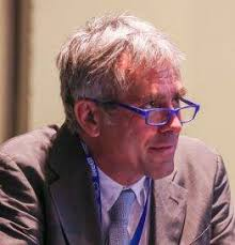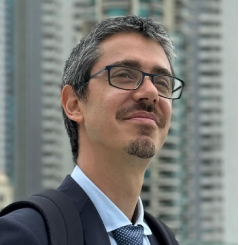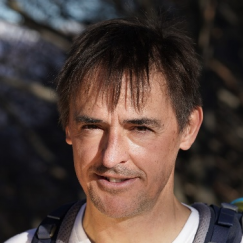ISDE International Lectures, organized by the International Society for Digital Earth (ISDE) are a series of online events which feature invited lectures by well-known international experts in the field of Digital Earth. The event will invite speakers to give lectures every two months. The purpose of the events is to bring international scholars in the relevant research fields of Digital Earth together to exchange academic perspectives, share research results, and disseminate the most cutting-edge and authoritative concept of Digital Earth.
The 13th ISDE International Lectures
The 13th ISDE International Lectures, with the theme of “Advances on the Global Human Settlement Layer by joint assessment of Earth Observation and Population Survey data”, will invite three speakers to deliberate on different perspectives of the Global Human Settlement Layer (GHSL) and present their latest research findings from the paper they co-authored. Topics to be covered include the theoretical framework, EO derived information, spatial distributions of population, and quality assessment of GHSL.
Theme: Advances on the Global Human Settlement Layer by joint assessment of Earth Observation and Population Survey data
Date & Time: 11th November, 2024, 9:00-10:30 AM (Central European Time)
11th November, 2024, 4:00-5:30 PM (China Standard Time)
Organized by: International Society for Digital Earth
Supported by:
International Research Center of Big Data for Sustainable Development Goals
International Journal of Digital Earth
Big Earth Data
Invited Speakers:
Martino Pesaresi (European Commission's Joint Research Centre, Italy)
Marcello Schiavina (European Commission DG Regional and Urban Policy, Italy)
Johannes H. Uhl (European Commission's Joint Research Centre, Italy)
Moderator:
Thomas Kemper (European Commission's Joint Research Centre, Italy)
Programme:
Time Zone (Central European Time, CET) | |
9:00-9:05 | Welcome and Introduction |
9:05-9:25 | Topic: General theoretical methodological frame and EO derived information in the GHSL Speaker: Martino Pesaresi (European Commission’s Joint Research Centre, Italy) |
9:25-9:45 | Topic: The spatial distribution of the resident population and the "Degree of Urbanization" in the GHSL R2023 Speaker: Marcello Schiavina (European Commission DG Regional and Urban Policy, Italy) |
9:45-10:05 | Topic: Evaluating the quality of the Global Human Settlement Layer R2023A Speaker: Johannes H. Uhl (European Commission’s Joint Research Centre, Italy) |
10:05-10:30 | Group Photo Q&A |
Zoom Link:
https://us06web.zoom.us/j/83885846764?pwd=hucAoI8Fsl0wPRmwOrLuglRNMkgu5x.1
ID: 838 8584 6764, Password: 659964
Contact:
ISDE Secretariat (Email: isde@radi.ac.cn, Tel.: 86-10-82178912)
Short Bio of Invited Speakers:

Martino Pesaresi
European Commission's Joint Research Centre, Italy
Dr. Martino Pesaresi works at the European Commission’s Joint Research Centre (JRC), where he contributes to programs focused on the use of space technologies for automatic image information retrieval and decision support systems. From 2005 to 2007, he served as the scientific coordinator of the Global Monitoring for Security and Stability (GMOSS) Network of Excellence. In 2014, he initiated the Global Human Settlement Layer (GHSL) project activities at the JRC, establishing new geospatial analytics technologies to assess human presence on the planet in support of post-2015 international frameworks. In 2016, he launched the “Human Planet” international initiative within the Group on Earth Observations (GEO) work program, which he co-chaired until 2022.

Marcello Schiavina
European Commission DG Regional and Urban Policy, Italy
Dr. Marcello Schiavina graduated in Environmental and Land Planning Engineering at Politecnico di Milano and he holds a PhD in Quantitative Ecology at the University of Parma. From 2008 to 2016, he dedicated his academic research career to study the population dynamics and the physical transport of marine biological resources through statistical and mathematical models. The focus of the research was to represent and investigate quantitative physical and biological processes for the management of fish resources (stock assessment and fishery), especially in the context of Marine Protected Areas. In 2016, he joined the GHSL team at the European Commission Joint Research Centre focusing on human population dynamics at regional and global level. He contributed to the development, implementation and capacity building of the Degree of Urbanisation, the UN recommended methodology for the identification of urban and rural areas for international comparison. Since 2022, he serves the European Commission DG Region as external freelance consultant aiming at studying the development of human settlements through the production of global and regional population distribution grids and the implementation and improvement of the Degree of Urbanisation.

Johannes H. Uhl
European Commission's Joint Research Centre, Italy
Dr. Johannes H. Uhl is a Geographic Information Scientist working at the European Commission's Joint Research Centre (Italy), where his work focuses on long-term, integrative human settlement modelling using multimodal geospatial data, as well as data uncertainty assessments and data visualization. He holds a PhD in Geographic Information Science from University of Colorado Boulder (USA) and has over 15 years of experience in the geospatial domain in the industry and in the academic sector.
Short Bio of the Moderator:

Thomas Kemper
European Commission's Joint Research Centre, Italy
Dr. Thomas Kemper is leading the Global Human Settlement Layer (GHSL) project at the European Commission, Joint Research Centre. He has a wide experience in remote sensing for the detection and characterization of human settlements in support of EU policies. He obtained a doctoral degree in geosciences from the University of Trier (Germany) in 2003. From 2004 to 2007, he helped in setting up the Center for Satellite-Based Crisis Information (ZKI) of the German Aerospace Center (DLR). Since 2007, he is working at the JRC on the analysis of human settlements in the GHSL project.
Extended Materials:
About the previous ISDE International Lectures:
https://www.digitalearth-isde.org/list-34-1.html
Access to IJDE Paper “Advances on the Global Human Settlement Layer by joint assessment of Earth Observation and Population Survey data”:
https://www.tandfonline.com/doi/full/10.1080/17538947.2024.2390454
Profile of Dr. Martino Pesaresi:
https://orcid.org/0000-0003-0620-439X
Website of the European Commission’s Joint Research Centre:
https://joint-research-centre.ec.europa.eu/index_en
Website of the Global Human Settlement Layer (GHSL):
https://human-settlement.emergency.copernicus.eu/

2004-2026 All Rights Reserved 京ICP备06045536号-1 京公网安备 11010802041631号